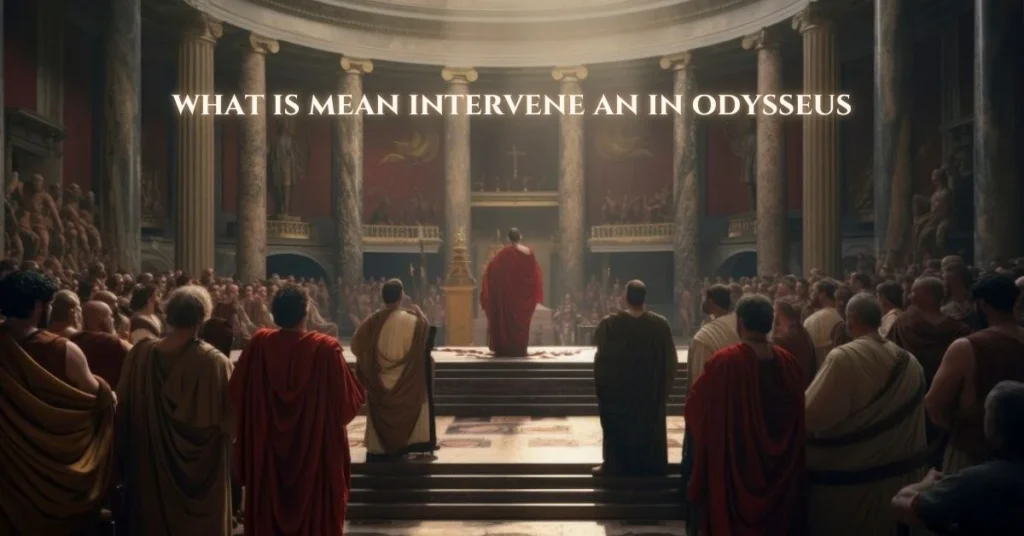Introduction to what is mean intervene an in odysseus
The epic tale of Odysseus is more than just a story of adventure and heroism; it’s a profound exploration of fate, choice, and the forces that shape our destinies. When we dive into this timeless narrative, one question looms large: what does it mean to intervene? Both divine beings and human actions play pivotal roles in steering Odysseus through trials that test his character and resolve. From gods who wield power over mortals to the choices made by those he encounters along his journey, intervention shapes every twist and turn. Join us as we unravel the layers behind “what is mean intervene an in Odysseus,” exploring how these interventions impact his legendary quest homeward.
ALSO READ: Everything about dune: part two showtimes
Analysis of divine intervention in Odysseus’ journey
Divine intervention plays a crucial role in Odysseus’ epic journey. The gods frequently intervene, shaping his fate and experiences. Athena, the goddess of wisdom, emerges as his foremost ally. She guides him through numerous challenges.
Her support is evident from the outset when she advocates for him among the other gods. With her assistance, Odysseus receives much-needed protection against foes and obstacles.
Poseidon, on the other hand, represents divine opposition. His anger stems from an earlier slight by Odysseus. This rivalry complicates Odysseus’ return home significantly.
Throughout this tale, we see how divine forces reflect human struggles and virtues like resilience and cunningness. These interventions highlight a theme: mortals are often at mercy to greater powers while simultaneously possessing agency in their choices and actions.
Examining human intervention in Odysseus’ story
Human intervention plays a crucial role in Odysseus’ journey. Characters like Penelope and Telemachus display the power of determination and loyalty. Their actions help sustain hope during Odysseus’ prolonged absence.
Telemachus embarks on his own quest for knowledge, seeking news of his father. His growth from a passive boy to an assertive young man highlights human resilience against adversity.
Penelope’s cleverness shines through her strategies to delay remarrying. She embodies strength amid uncertainty, showing how human wit can outsmart fate itself.
Additionally, the suitors represent negative human influence, illustrating greed and entitlement. Their actions further complicate Odysseus’ return, adding layers of conflict that stem from flawed humanity.
Through these characters, Homer illustrates that while gods may intervene with power, it is often our choices and relationships that shape destinies more profoundly than divine whims ever could.
The consequences of divine and human intervention on Odysseus and his journey
Divine and human interventions shape Odysseus’ journey in profound ways. The gods frequently alter the course of his fate, often acting as both protectors and challengers. Athena’s guidance helps him navigate treacherous waters, while Poseidon’s wrath slows his return to Ithaca.
Human intervention also plays a critical role. Characters like Circe and Calypso offer moments of respite yet complicate his quest for home. Their actions provide lessons but also test Odysseus’s resolve and loyalty.
These interactions create an intricate web of challenges that influence not only Odysseus’s physical journey but also his character development. Each encounter pushes him toward growth, revealing vulnerabilities alongside strengths.
These forces highlight the interplay between destiny and choice, underscoring how external influences can shape one’s path while still allowing room for personal agency in overcoming obstacles.
Lessons we can learn from the concept of what is mean intervene an in odysseus
The journeys of Odysseus teach us about the delicate balance between fate and free will. His encounters with gods reveal how divine guidance can shape our paths, yet they also highlight the unpredictability of life.
We learn that while external forces may intervene, our choices ultimately define who we are. Odysseus displayed resilience in adversity, reminding us that perseverance often leads to triumph.
Moreover, his relationships emphasize the importance of human connection. Allies and adversaries alike played pivotal roles in his journey, showcasing how collaboration or betrayal can alter destinies.
Odysseus’ trials urge us to reflect on moral decisions. The consequences of both divine and human actions serve as a powerful reminder that every choice carries weight—guiding not just our own lives but those around us too.
Comparison to other epic tales with similar themes
Epic tales often weave threads of divine and human intervention, much like Odysseus’ journey. In “The Iliad,” for example, gods frequently meddle in the affairs of mortals, influencing outcomes on the battlefield. Achilles’ fate shifts dramatically due to divine whims.
Similarly, Virgil’s “Aeneid” showcases Aeneas navigating both mortal struggles and divine directives. The interplay between destiny and free will shapes his quest as he seeks to establish a new homeland.
Even in more contemporary narratives like Tolkien’s “The Lord of the Rings,” characters face monumental challenges influenced by greater forces. Gandalf guides Frodo while darker powers loom ominously over Middle-earth.
These stories echo similar themes: the complex dance between fate and personal agency remains timeless across cultures. Each hero grapples with external forces shaping their destinies while striving for self-discovery despite overwhelming odds.
Conclusion: The significance of what is mean intervene an in odysseus
The significance of what is mean intervene an in Odysseus extends beyond the pages of ancient literature. It showcases the interplay between fate and free will, divine influence and human agency. Odysseus’ journey reflects our own struggles with challenges that shape who we are.
Divine intervention plays a crucial role in guiding him through trials, while his decisions demonstrate the power of human resolve. Each encounter highlights how both forces can intertwine, creating outcomes that resonate well beyond mythological tales.
Understanding this dynamic offers profound insights into our lives today. We face choices influenced by external factors but ultimately make decisions ourselves. This timeless narrative invites us to contemplate how much control we truly have over our destinies amid life’s uncertainties.
Through exploring these themes within Odysseus’ epic tale, readers can appreciate not only its historical context but also its relevance to contemporary existence. The lessons learned from this ancient hero remind us that whether guided by gods or driven by personal ambition, every journey is uniquely ours to navigate.
ALSO READ: The Best Jujutsu Kaisen Manga Moments Ranked
FAQs
What is “what is mean intervene an in Odysseus”?
It refers to the various ways gods and humans influence Odysseus’ journey. Divine beings like Athena and Poseidon, along with human actions, help or hinder Odysseus, affecting his fate and decisions throughout his epic quest.
How does divine intervention affect Odysseus?
Gods like Athena guide Odysseus, providing support and protection, while Poseidon opposes him, creating obstacles. These divine interventions shape Odysseus’ journey and reflect themes of fate and free will.
What role do humans play in Odysseus’ journey?
Humans like Penelope and Telemachus significantly impact Odysseus’ fate. Penelope’s cleverness and Telemachus’ growth help maintain hope, while the suitors represent negative human influence that complicates his return home.
What lessons can we learn from the interventions in Odysseus’ journey?
Odysseus’ story teaches us about resilience, the importance of human connections, and the balance between fate and free will. His journey reminds us that while external forces shape our path, personal choices define who we become.
How is Odysseus’ journey similar to other epic tales?
Like “The Iliad” and “Aeneid,” Odysseus’ story shows the tension between divine influence and human agency. These tales explore how external forces affect the hero’s fate while also highlighting the hero’s role in shaping their destiny.







